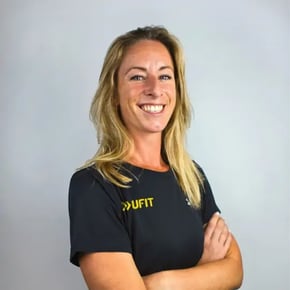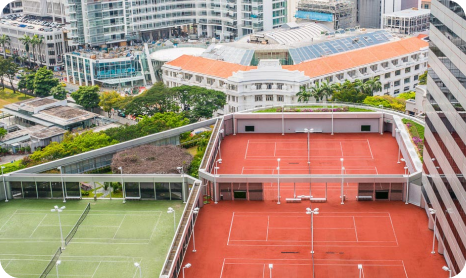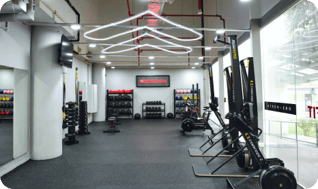Sadly, ACL, or the Anterior Cruciate Ligament, injury is common in sports. The impact of a torn ACL can be significant, requiring both time and commitment if you want to return to regular sporting activities.
To help you navigate the journey of ACL rehabilitation, we've enlisted the help of Davina Sherwood, one of UFIT's Senior Physiotherapists, who has 19 years of experience as a sports physiotherapist specialising in this area. She cannot stress enough the importance of surrounding yourself with a specialist healthcare team to help guide your recovery.
What is the ACL?
The ACL is an important ligament in the knee that provides stability and function. Tears to the ACL most commonly occur in sports that involve pivoting, sudden stops, or jumping and are frequently accompanied by an audible “popping” sensation in the knee. An ACL tear can cause instability, swelling, pain, and difficulty bearing body weight.
A prompt referral to a specialist orthopaedic consultant for a detailed assessment is important to ascertain the extent of the injury and avoid the risk of further injury to the knee joint.
What are ACL management options?

There are surgical and non-surgical options available for ACL injuries. It’s common for injured individuals to pursue surgery before a period of rehabilitation, but, for some, rehabilitation alone can lead to a successful recovery.
The best option ultimately depends on several factors, including age, physical condition, the severity of the injury, and sporting aspirations. Regardless, a detailed assessment and discussions with an orthopaedic consultant and physiotherapist are strongly recommended.
What is the ACL rehabilitation process?
A progressive and thorough rehabilitation programme is crucial for restoring function, stability, and strength to the knee joint. Typically, the process consists of four stages:
- Stage 1: Focuses on settling pain and swelling post-injury, restoring your knee’s range of motion, normal walking patterns, and activation of major muscle groups with a focus on the quadriceps.
- Stage 2: Continues working on good muscle recruitment and building your endurance to tolerate daily activities, while progressively improving balance and cardiovascular fitness.
- Stage 3: Shifts more specifically to strength work, involving heavier weights and lower repetitions to build muscle. When sufficient strength levels have been restored, work shifts to light plyometrics—jumping, landing control, and hopping—to prepare for a return to running.
- Stage 4: Shifts to force production to improve power, speed, and agility, as well as psychological factors like confidence in the knee to work dynamically.
At each stage, specific goals must be met – time alone should not be the guiding factor in your rehabilitation. It goes without saying that access to a gym for strength and power work is essential. We offer fully equipped gym facilities and champion an integrated approach that collaborates closely with personal trainers to meet rehabilitation requirements.
The importance of a specialist healthcare team

Surrounding yourself with professionals who have experience dealing with the challenges of ACL injuries is essential if you wish to maximise your recovery.
An orthopaedic consultant is integral to accurately diagnosing ACL injuries. Through detailed imaging techniques like MRI scans, they can assess the extent of your injury and determine the best course of action. Early diagnosis and treatment are key to avoiding complications and avoidably drawn-out recovery times.
A physiotherapist is as important in guiding the rehabilitation journey. They will have experience dealing with musculoskeletal rehabilitation and can develop personalised programmes to strengthen and stabilise your knee joint. From Stage 1 to Stage 4, they provide invaluable support and expert guidance every step of the way.
The role of exercise in ACL rehabilitation
Regardless of the rehabilitation stage, exercise–strength, function, and mobility–forms the foundation of every management plan.
In Stage 1, when ACL injuries are acute, gentler ranges of motion and manual therapy are used to help reduce swelling and promote healing. As your journey progresses, the focus shifts to exercises that strengthen the muscles around the knee joint. Proprioceptive training, which involves exercises that challenge balance and coordination, is also critical to enhance joint stability and reduce the risk of re-injury.
As pain and swelling reduce, functional exercises, such as squats and step-ups, can be added to your rehabilitation programme to build confidence and strength in activities of daily living. While some discomfort may accompany this stage, it’s essential to remain consistent–optimal results are achieved by adherence to your programme.
The journey back to sport
/01%20Pages/Homepage/homepage-sports-min.jpg?width=600&height=600&name=homepage-sports-min.jpg)
Returning to sport after an ACL injury is a significant milestone. While you may be eager to do so, it’s essential to approach it cautiously and ensure that safety is prioritised to ensure long-term success.
Physiotherapists commonly require you to pass functional assessments or tests before returning to sport. These will assess your strength, balance, proprioception, and more to ensure the knee joint is ready to return to the sporting activity.
A slow reintroduction to sport is strongly recommended, starting with low-impact activities and conservatively increasing intensity and volume over time. You should maintain a relationship with a physiotherapist during this time to identify any signs of regression or re-injury.
Our role in ACL rehabilitation
We understand how challenging the recovery from ACL injuries can be. To make that challenge as pain-free as possible, we’ve gathered a dedicated team of physiotherapists, personal trainers, dieticians, and orthopaedic consultants (as well as links to mental health support) all under one roof. We aim to work together as a specialist healthcare team to provide comprehensive care and support during your rehabilitation.
Through our Circle of Care, you will receive all the support you need from skilled professionals at our state-of-the-art facilities. The programme and support you need to overcome the physical and psychological challenges that come with ACL injuries are waiting for you here at UFIT.


.png?width=301&height=187&name=Website%20Navigation%20Images%20(3).png)

-1.jpg?width=1984&height=1196&name=UFIT%20Club%20Street%20Front%20(4)-1.jpg)






